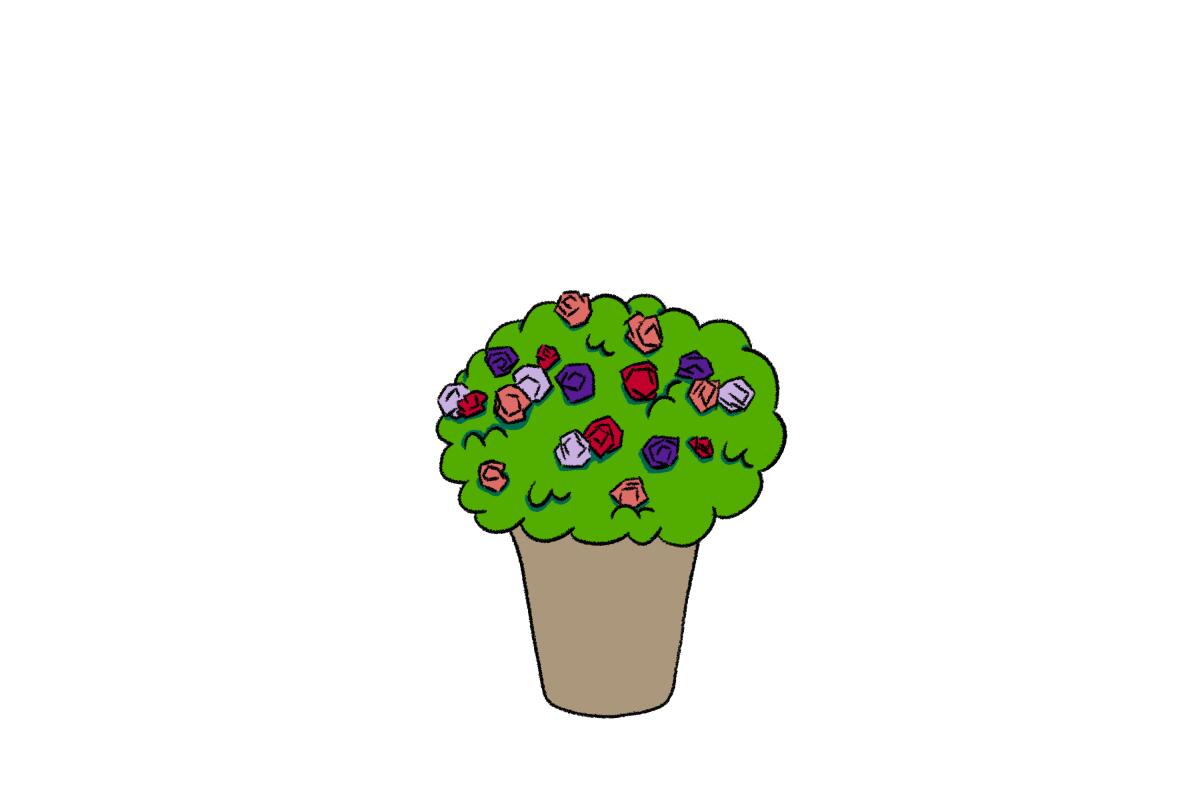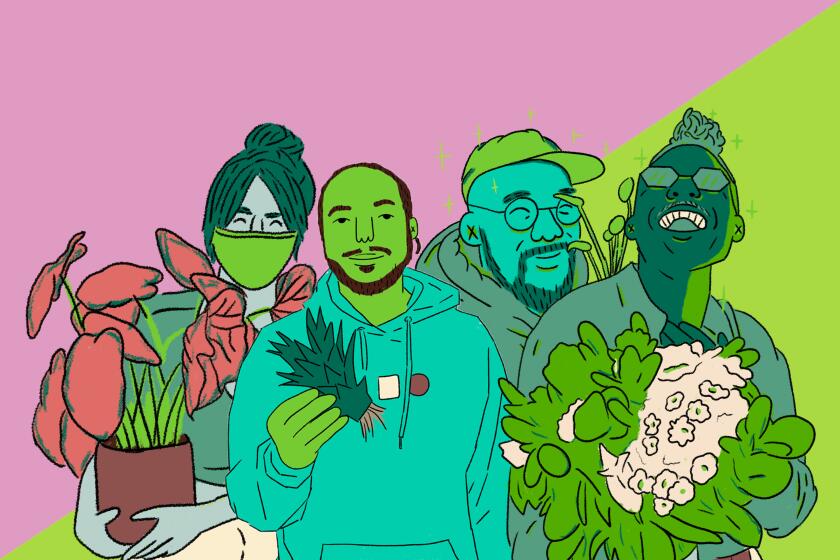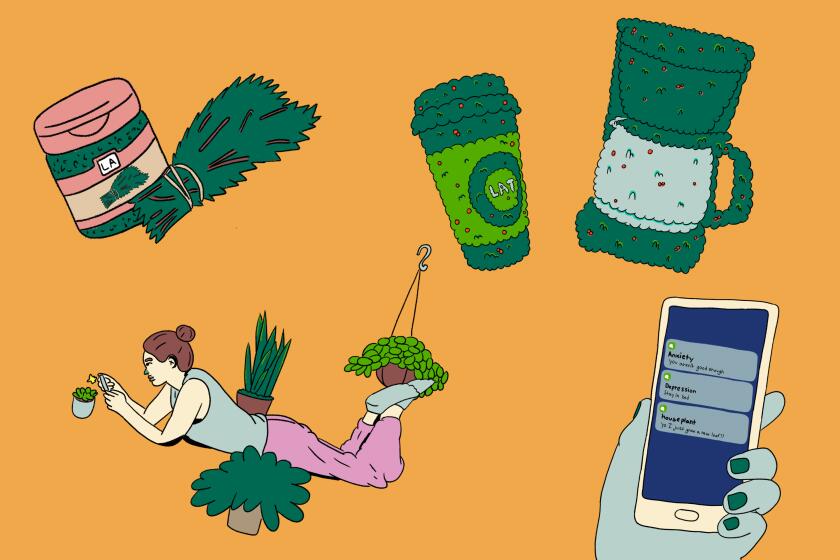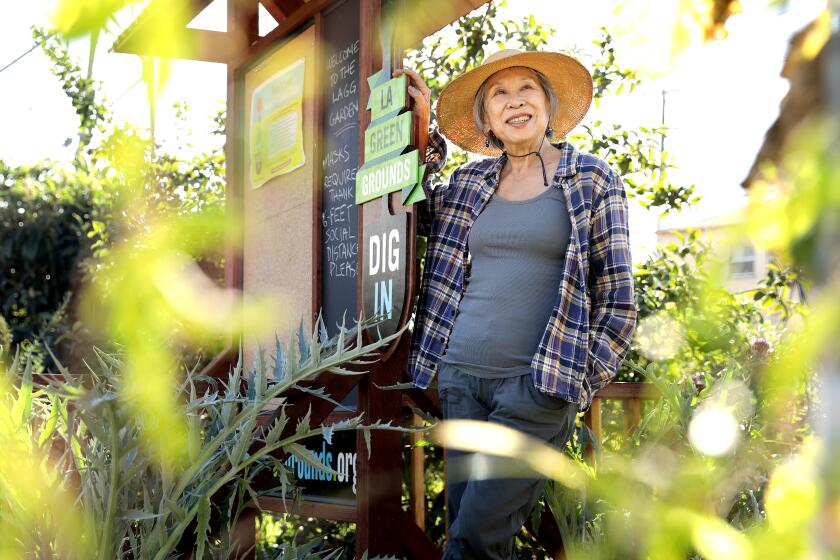She taught herself to be a florist by watching YouTube
- Share via
This is part of our series PLANT PPL, where we interview people of color in the plant world.
Mallory Browne always said she’d be a florist in her next life, but why wait? Toward the end of 2017, while working a desk job focused on the analytical side of marketing, Browne said to herself, “I don’t know what it’s going to be but I need to use my hands for something other than typing.” Later on, during a walk with her boyfriend, she said she felt compelled to vocalize what her intuition was telling her: “I’m going to be a florist.”
For the record:
12:28 p.m. Dec. 29, 2020An earlier version of this story misidentified the photographer who took the main image as Bryan Octaviano. The photo was taken by Lara Kaur.
Known as “Mallory With the Flowers” on Instagram, Browne has virtually documented her journey as a self-taught florist who started by watching YouTube videos and designing arrangements with grocery store blooms. More than two years later, she has cultivated a portfolio demonstrating why she was called to be a florist: Her arrangements are as unique as fingerprints.
This year, Browne started the Flowers for Black Men project to support the Black men witnessing the unjust, highly publicized deaths of Black men (George Floyd, Tony McDade, Rayshard Brooks, Daniel Prude and many more) at the hands of police. Since flowers are symbols of sympathy and love in times of tragedy, Browne encouraged followers to send flowers to the Black men in their lives, and she donated 100% of the proceeds earned to the change-making Minneapolis organizations Black Visions and Reclaim the Block.
She recently reached a crossroads in her floral career and has officially transitioned into being Mallory With the Flowers on a full-time basis. Her work landed her an appearance on an episode of Issa Rae’s HBO series “Insecure.”
In our Plant PPL series, we interview people of color in the plant world, including plantfluencers, plant stylists, floral artists, enthusiasts, experts and garden store owners.
There are so many creative pursuits that involve using your hands. Why did floral design stand out to you?
It just sounds like such an amazing career. You’re in a room with pretty things all day. I didn’t think about any of the back-breaking work that I now know goes into it.
I honestly don’t know why I said, “I want to do it now.” But it’s crazy because when I started doing it, my dad — [who] was a little apprehensive because he wants his kids to have a career in an office — told me that his grandmother in Barbados used to be a wholesale florist. He would deliver for her. And I had no idea. It was meant to be, in a way.
Here’s a look back at our funniest plant memes of 2020
Your Instagram follower count is now more than 10,600. Why do you think your work resonates with so many people?
When I first started, I think what resonated was that I never tried to pretend to be this master floral designer. I’m always transparent: “I’m trying this.”
Most of my followers and people who ordered from me are people of color, especially Black people. I’m so grateful that my community has surrounded me in this pursuit of flowers because I think a lot of times, we don’t see too many mainstream floral artists who are Black women. I think people were like, “Wow, a Black florist,” and that’s what drew them in.
When I started, I was thinking too much about “How do I look like this? How do I make my page look like that?” Then I decided to throw all of that out the window and make it look like my community and my surroundings. I would take pictures out in the streets and add flowers in random places, [making] it attainable and something [that will resonate with people] without trying too hard.
There are a bunch of pages that are really pretty in Joshua Tree and Malibu, but what about on a street in West Adams? That’s why I tried to make sure my [online presence] looked like where I was from.
What inspired your Flowers for Black Men initiative?
I’m super close with my dad, and I live with my boyfriend of almost four years, who’s Black. I have an older brother. So a lot of my life experience has been around Black men and the stories of Black men. When [police brutality protests were happening, I asked myself], “What can I do? Because it’s not like I have a bunch of money to donate. How can I use what I have to let [Black men] know that we care?” Seeing people you love read these stories every day about police killing people who look just like [them] — even though I’m a Black woman, I have my own privileges as a mixed-race person, so I couldn’t really imagine that feeling.
In South Los Angeles, where it is easier to find fast food than an apple, master gardener Florence Nishida is on a mission to teach the community how to grow their own food. “There’s a lot more than peas and carrots,” Nishida says.
I was thinking that when something traumatic happens to you, typically you get flowers. And right now, this is traumatic, so let’s give them flowers. There’s [the saying that you should give] people flowers while they’re still alive. That pretty much embodies Flowers for Black Men — letting them know we love them and see them.
What was the response like?
The response to that was insane. It was crazy because I think no one was realizing that guys like flowers. Men were blushing when they got the flowers. Most of them said they had never received flowers in their life and they were so happy to get that symbol of love from someone else. It was one of the best things I’ve ever seen. I just wanted to do something that was true to myself, which obviously [involves] flowers, but make an impact on a personal level with people.
Has your relationship with plants and your floral work changed in any way because of the pandemic, police brutality news and protests, and everything else 2020 has brought to the surface?
I would say it has because we’re all home, all day, so it’s [about asking yourself], “What do you want to devote your time to?” In the beginning, I [thought], “This is a time for rest.” But then I was forcing myself to rest. I don’t want to rest. I want to keep creating. So it’s given me the space to decide what I want, what I want out of flowers, and what I hope to grow out of creating floral designs.
I saw that you were recently on an episode of “Insecure.” How did that happen? What was it like?
I was doing an event [at] Hank’s Mini Market. It’s a market out in South L.A. that was started by Kelli Jackson. There were a bunch of foodies there, and Kelli asked me to stay. I typically like to set up and leave, but I love Kelli, so I stayed. I was sitting with two people, Nicole and Derek Steele, who are part of the Social Justice Learning Institute in Inglewood. I was the only nonfoodie or food-justice person at this whole event, but I got to learn a lot from them. Then, a few months later, they hit me up and said, “‘Insecure’ reached out to us to curate this market because they’re really great about reaching out to community people. They specifically asked for a florist, and we thought that you would be great for it.” The stars aligned in that way.
I honestly thought I was just going to show up and pretend to be making bouquets, but then they started setting up all of the cameras by my station. I was like, “Wait, am I going to be on the show?”
What’s your favorite plant?
My favorite flower — this is a basic answer, but I’m going to say roses. They come in so many different colors, they’re really strong, and I can always count on them.
My favorite plant is the string of hearts I just got from my friend the Plant Chica.

More to Read
Sign up for The Wild
We’ll help you find the best places to hike, bike and run, as well as the perfect silent spots for meditation and yoga.
You may occasionally receive promotional content from the Los Angeles Times.












